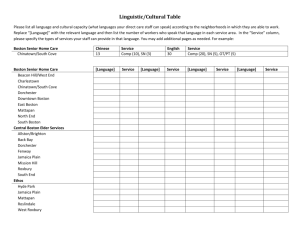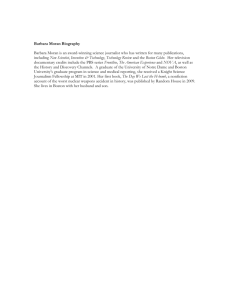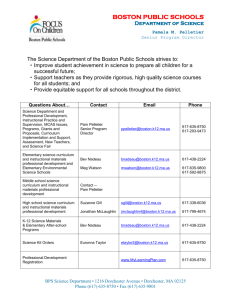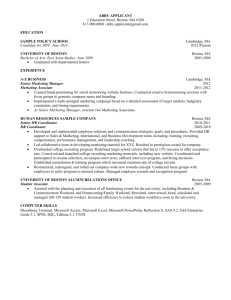fiscal year 2013 report to the attorney general
advertisement
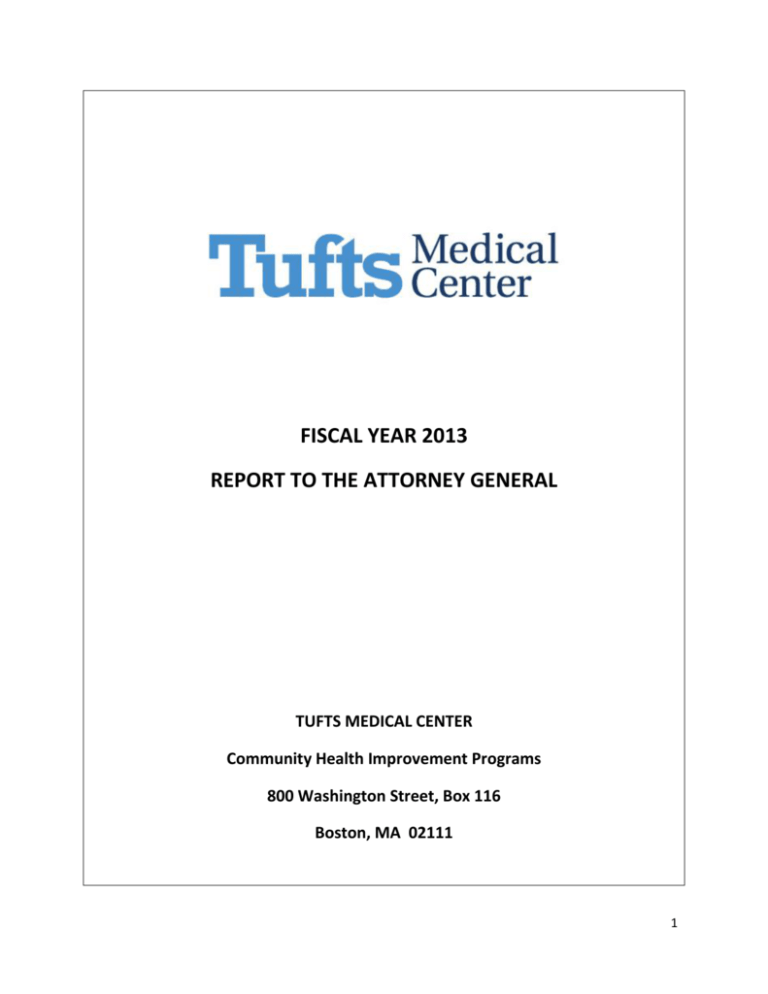
FISCAL YEAR 2013 REPORT TO THE ATTORNEY GENERAL TUFTS MEDICAL CENTER Community Health Improvement Programs 800 Washington Street, Box 116 Boston, MA 02111 1 Our History and Our Mission Located in Downtown Boston within Chinatown and the Theater District, Tufts Medical Center (Tufts MC) is the oldest permanent medical facility in the United States. The Boston Dispensary was established by early American patriots including Paul Revere, Samuel Adams and Oliver Wendell Holmes, to provide medical care to those in need. Over the last two hundred plus years, the Boston Dispensary, Floating Hospital for Children and Pratt Diagnostic Institute have joined to become Tufts Medical Center which continues to honor its original mission to provide care to Boston residents, and regionally, while fulfilling important roles as the principal teaching hospital for Tufts University School of Medicine, and a full-service tertiary and quaternary referral and research medical center. The commitment to meeting the needs of Boston residents, in particular the residents from the neighborhoods of Chinatown, Dorchester and South Boston which are in close proximity to the Medical Center and with which it has had long and historic relationships, is reflected by grant-funded initiatives which focus on a particular geography, target population and/or health issue. It is also reflected in medical departments’ efforts to institutionalize education, early screening, diagnosis and treatment for illnesses that can be prevented or treated early to restore patients to good health. The health issues and/or health disparities that affect the patient population and the priority neighborhoods are reviewed on a regular basis by senior level staff and advisory committees to ensure that resources are responsive to community health needs. Health issues identified in Tufts MC’s 2010 Needs Assessment guided its grant-making for three fiscal years as well as internal efforts to address critical health issues for the neighborhoods of Chinatown, Dorchester and South Boston as well as patients for a number of medical specialties. Addressing Community Needs Tufts Medical Center has three grant-funded initiatives which provide resources to community-based organizations to enable them to integrate health education, outreach and prevention into their core services. The priority health issues for each of the initiatives are determined by a review of available public health data and input from advisory committees comprised of community members, social service and healthcare providers. Grantees are identified through an open and competitive application process to build their capacity to address health disparities which adversely impact their constituents and communities and to promote wellness. Both the Asian Health Initiative (AHI) and the Dorchester Health Initiative (DHI) identified health priorities as obesity and diabetes. The AHI identified cigarette smoking and its consequences, and DHI identified youth 2 violence prevention as additional priorities, respectively. inform community members about the risks associated with obesity, diabetes and smoking. The third grant-funded initiative, Parent-toParent (P2P) program is focused on improving maternal and infant health by promoting early and consistent pre-natal care to reduce the incidence of low-birth weights and infant mortality. The five organizations reached over 6400 Chinatown residents and members of Boston’s Asian community. The AHI grantees completing their third year of a three cycle were: Tufts MC also responds to community health needs by providing operating and/or program support to community health centers which know their communities and patients’ needs well. Tufts MC also considers and responds to emerging health issues impacting communities by fostering collaborations to support access to healthcare. Chinatown Asian American Civic Association: Sampan Health Column Boston Asian: Youth Essential Service: Teens Going Healthy Boston Chinatown Neighborhood Center: Rock Your Body Greater Boston Chinese Golden Age Center: Understanding Diabetes Wang YMCA: Teen EBALANCE (Early Beginning Active Lifestyle & Appropriate Nutritional Choices Education) Chinatown is one of the smallest and most densely populated neighborhoods in the City of Boston. Chinatown serves as a social, cultural and economic hub for the community and provides essential services to Greater Boston’s Asian community seeking health care, education, employment services, and housing and immigration assistance. The AHI funded five organizations for a threeyear cycle to serve Chinatown residents and Boston’s Asian community. Three organizations offered an array of services to children/youth and their parents to prevent obesity, encourage good nutrition, healthy food choices and lifestyles which included regular exercise. Another organization focused on helping seniors to better understand the diagnosis and management of their diabetes. The fifth grantee published a bi-weekly, bilingual (English/Chinese) health education column to 3 Dorchester Dorchester is the largest neighborhood in the city of Boston in terms of size and population. It is comprised of North and South Dorchester and numerous sub-neighborhoods including Codman Square, Fields Corner and Uphams Corner. The DHI selected six organizations to provide health services to the Dorchester community, which reflect the racial/ethnic, linguistic, cultural and economic diversity in the City of Boston. Four of the DHI grantees focused on youth violence prevention. They offered different types of program services to engage youth in positive activities with the goal of reducing risky behaviors and the risk for violence. Two DHI grantees focused on helping adults to better understand and manage their chronic diseases to improve overall well-being and quality of life. The six grantees collectively served over 2900 Dorchester residents: Bird Street Community Center: Individual Case Management Services for Youth Codman Square Health Center: Diabetes and Obesity Prevention Project Harbor Health Services/Neponset Health Center: Youth Violence Prevention Kit Clark Senior Services: Fit-4-Life Sportsmen’s Tennis & Enrichment Center: Volley Against Violence Vietnamese American Initiative for Development: Youth Violence Prevention Parent-to-Parent Program The Parent-to-Parent (P2P) program has been focused on improving maternal and infant health since 1992. The initial focus for P2P was identifying and training community members with the linguistic and cultural skills to engage at risk community members in early prenatal care. P2P now focuses on engaging at-risk community members in early prenatal care, and has funded community-based organizations, primarily in Dorchester, to provide outreach, education and case management services to pregnant women. Historical and current health data indicate that Dorchester continues to experience higher rates of premature births, low-birth weights and infant mortality, thus the majority of P2P sites are in Dorchester. In FY 2013, six organizations began a new threeyear cycle with the P2P. Four organizations focused on the Dorchester community, and two smaller initiatives focused on the Chinese community. Together they provided an array of services including pregnancy prevention, family planning and behavioral health services. The six P2P grantees were: Boston Asian: Youth Essential Service Codman Square Health Center Dorchester House Multi-Service Center 4 Harbor Health Services/Neponset Health Center La Alianza Hispana Sharewood Project Six hundred five (605) women benefitted from the P2P program: 556 from Dorchester and 49 from the Chinatown/Boston Asian community. South Boston Historically South Boston has been home to working class families. In recent years there has been a wave of housing development that has replaced commercial warehouses and light industrial areas with market and luxury rate housing and new industries. Long-standing health issues, however, continue to concern long-time community members and service providers. Substance abuse and its effects on an individual’s overall health and the health and well-being of the family unit is a major issue. Since the 1990s Tufts MC has provided resources to two community organizations to help prevent substance abuse and support recovery efforts. These two organizations, South Boston Community Health Center and the Gavin Foundation, along with Tufts MC departmental efforts, provide clinical services to youth and adults in community-based recovery programs and served 14,418 individuals in the past year. Meeting Community Health Needs Tufts Medical Center responds to the needs of its priority neighborhoods of Chinatown, Dorchester and South Boston and patients in a number of ways: providing funding for health centers to expand services or to focus services on a particular health issues and by encouraging hospital departments to address health issues that disproportionately affect specific populations (health disparities); developing and initiating partnerships with community organizations to address health disparities or the health needs of vulnerable populations for whom there are barriers to health care. Health Center Support In FY 2013 Tufts Medical Center provided financial support to two health centers to enable them to address critical health issues for their patient community. These two health centers, Harbor Health Services’ Neponset Health Center and South Boston Community Health Center provided clinical and educational services to improve birth outcomes or asthma management and prevent substance abuse. Reducing Health Disparities through Departmental Efforts and Community Partnerships Medical Departments design and initiate special screenings and health education efforts for patients and/or community members who have a high incidence of a particular disease. These efforts are intended to prevent the disease and/or promote early treatment. Community non-profit organizations are ideal partners for providing health education to residents of Chinatown, Dorchester and South Boston. Activities are not only developed with in-put from community partners and are often hosted by our community partners. Asthma Prevention and Management Initiative provided educational sessions, home visiting assessments to help Floating Hospital pediatric patients and the community’s youth more effectively manage their asthma and reduce emergency department visits. Educational and family counseling sessions are conducted in English and Chinese. Cancer Screenings – offered to populations at risk for higher incidences of oral, head, neck, nasopharyngeal, breast or cervical cancer by the 5 Otolaryngology and Pathology, OB/GYN Departments. Diabetes Workshops – designed and offered by the Department of Internal Medicine/General Medical Associates to Chinese speaking patients and community members to improve their understanding of diabetes and its management. Hepatitis B Community Education promoted best practices to improve screening and vaccinations of the Asian community through community programs and student led initiatives. Kidney Early Evaluation Program – offered free screenings and educational materials to Roxbury and Chinatown residents with high blood pressure or a family history of kidney disease to prevent or delay the onset of kidney disease and post-partum care for vulnerable populations and to improve birth outcomes for the Tufts MC’s patients and patients from three community health centers. Prevention and Chronic Disease Management Diabetes Management workshops were offered on a regular basis to Chinese patients and the Chinatown community to improve and support diabetes management. Eye Health Screenings were conducted in Brighton and Quincy to assess seniors for visual impairments and undetected eye disease and ensure that they were connected to resources for further evaluation and treatment. Hypertension and Kidney Disease Screenings were offered by Adult and Pediatric Nephrology Services at community events and at hospital based cancer screenings to evaluate risks and promote early treatment for children and adults. Reducing Health Disparities and Improving Maternal and Infant Health Asian Access and Women’s Care at Community Health Centers are two programs of the OBY/GYN Service to increase access to pre-natal 6 Promoting Wellness of Vulnerable Populations Metropolitan Boston Psychiatric Case Consultations were provided on a regular basis to staff at local Boston elementary schools to help address students’ behavioral issues. Funding was awarded to youth agencies working with at-risk youth to enable them to obtain consultations specific to the needs of their constituents and the professional development of staff. The following table summarizes the combined impact of community partners and Tufts Medical Center Departments to improve the health of Metropolitan Boston residents in Fiscal Year 2013. Recovery Services Support provided funding for the Gavin Foundation to help young adults with their recovery from substance abuse. Quincy Malden Lowell Other Metropolitan Cities Total 5,904 3,434 479 13,646 23,463 Community Services Tufts MC strives to be not only a good neighbor but a fully engaged contributing member of its community. This is reflected in an array of activities that includes staff contributing time above and beyond their scheduled work hours and supporting the social, economic and spiritual health of the community: Neighborhood Impact Highlights The following table summarizes the combined impact of community partners and Tufts Medical Center Departments to improve the health of Boston residents in Fiscal Year 2013. Chinatown Dorchester South Boston Other Boston Neighborhood Total 6,909 5,768 9,343 12,059 34,078 Organizing and staffing tutoring programs for pediatric patients Representing and participating in the Chinatown-South Cove Neighborhood Council’s Safety Committee Providing regular and free access to parking spaces for community nonprofits’ vans, church parishoners, and customers of community-owned businesses Participating in annual community service events such as Boston Shines and National Night Out Serving on the boards of communitybased organizations 7
